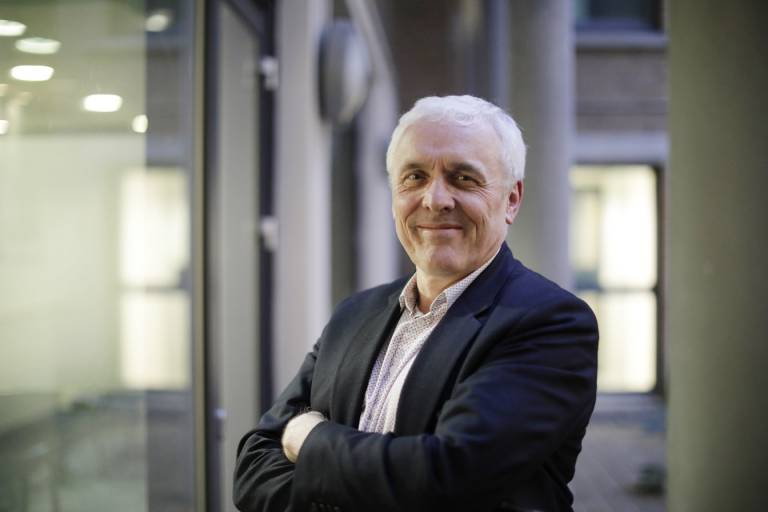An interview with Professor Anthony Costello
2 May 2018

Professor Costello is a renowned international expert on maternal, newborn and child health. He was previously Director of the Department of Maternal, Child and Adolescent Health at the World Health Organization, Professor of International Child Health and Director of the UCL Institute for Global Health.
You've had a varied career across clinical, academic and policy sectors - what's been your proudest achievement?
In my academic career, it would be setting up very large population studies across India, Nepal and Malawi to look at the health needs of communities and how they could help themselves. I worked with women's groups and conducted big cluster randomised trials to measure their impact on newborn death rates. It was especially fun because it was all based on team work and local engagement.
Within policy, I have two achievements of which I am proud. One is launching The Lancet Countdown for Climate Action, which tracks the world's response to climate change and the health benefits that emerge. The second was at the World Health Organization (WHO), where we set up the Network for Improving Quality of Care for Maternal, Newborn and Child Health. This has now been expanded across the 11 countries in which half of all global maternal and newborn deaths occur.
Across your career what has been the single most influential experience that has shaped your thinking?
Without question, it was going to live and work in Baglung, Nepal, a rural district two days' walk from the nearest road. I was there in 1984-6, when there was only one telephone in the entire town.
First hand experience of the reality of both rural poverty and rural dignity is something that has influenced my work across my career. And daal bhat (a staple Nepalese dish of rice, lentils and vegetables) is still my favourite meal.
When you look back, would you change anything?
I've honestly enjoyed everything I've done in my career, from being a clinician through to research projects and community work.
If I could change one thing, I would possibly have moved to the WHO a little earlier. I had to leave the organisation this year because of age restrictions, but ideally I would have liked to work there for five years, in order to expand and assess the impact of the changes we made while I was there.
Are we living in a better world today than yesterday? Will tomorrow's world be better still?
It's important to define what we mean by 'better', in terms of wealth and health. Wealth is not just GDP, but also encompasses a whole range of criteria. Globally we are making advances in human capacity, manufacturing and education, but several other factors such as institutional development and natural capital are in dramatic decline. The tendency to focus on human development rather than sustainability indices means that while we make improvements to human health, we could be living in an environment 50 years from now that is irreparably damaged. When I think about the future of humanity and the planet, in the words of philosopher John Gray, "I am not optimistic, but I am hopeful."
How are new technologies affecting global health?
Global health depends upon global opportunities, which in turn require economic opportunities and education. Modern technology is vital to this, as it means that people in rural communities can communicate and access information that wouldn't previously have been available. For example, farmers can check market prices on their mobile phones. That has to be a good thing, provided these advances don't lead to overconsumption of resources.
Do you believe that we are getting any better at tackling complex multi-stakeholder health problems?
I think working across disciplines, between government ministries or UN agencies is always difficult, because human beings by their nature like to work in small groups. When you are faced with a messy problem it is often overwhelming. For example, in the face of the 17 Sustainable Development Goals, governments sometimes feel paralysed with indecision. There's still a lot of fragmentation in the way we tackle such challenges. But we understand more now about 'health in all policies' and the links between our health and the environment.
You've travelled a lot for work, including considerable time in Malawi, Nepal and Bangladesh. Where would you most like to travel in the world?
I recently visited Senegal and would love to travel more in Francophone West Africa. There is a miisconception that the region's history began 200 years ago, but in fact they had a flourishing civilisation two millennia ago. However, in general I'm trying to travel less. My carbon footprint is terrible and I feel guilty about it, so I'd like to do more train travel.
What are you reading at the moment?
I've been in the same book group for about 20 years, in which time we've read over 200 books. We often end up diverting into discussions about football and politics, but we do discuss the books as well. At the moment we are reading The Dry by Jane Harper, which is a literary detective thriller. Last month was Bel-Ami by Guy de Maupassant which I loved. I enjoy a healthy debate about a book….it's rare that we share a unanimous opinion.
What does an ideal weekend look like for you?
My wife is from Yorkshire and we let a holiday home at Flamborough Head. My ideal weekend would be spent there with my family. It has a very beautiful and rugged coastline, with lots of puffins, gannets, skylarks and owls.
Who would be your fantasy dinner guests - alive or dead?
Nina Simone, Francis Bacon (the artist), Mary Wollstonecraft, William Shakespeare and Rembrandt.
 Close
Close

